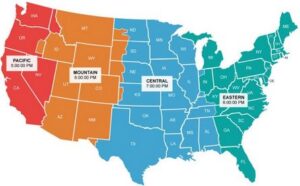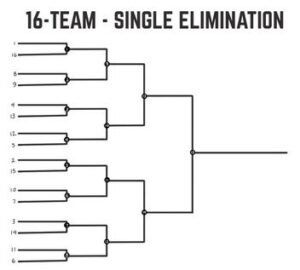Podcast: Play in new window | Download
Subscribe: RSS
In yesterday’s post, UCLA head football coach Chip Kelly said that the break-up of the Pac-12 Conference was a major mistake. He suggested that major college programs should declare their football teams to be “independent” and abandon the rapidly expanding conferences which are making less geographic sense.

Coach Kelly wants one division for the top 64 teams and another for the lower 64 teams. I agree.
Chip Kelly also suggested that players should be paid out of the gigantic pile of television revenues. I countered by saying that the annual cost of tuition, room, and board ($27,000 -54,000/year in 2023) should be a major consideration and deducted from the player’s proposed “pay” under such a system.

Though UCLA Coach Chip Kelly’s suggested 128 teams (64 apiece to form two separate upper division conferences), there are currently 133 teams playing in the FBS division this past season. Getting to 128 teams (a much easier number to work with) requires us to make a tough decision to drop five schools.
We will make that happen, too.
Coach Kelly’s idea is to forget about these rapidly changing conference affiliations (based on the astronomical rise in television rights fees being paid to the schools). Check out yesterday’s post for more on that subject.
We need two groups of 64 teams apiece to start this process. I will call them the Upper Grouping and the Lower Grouping for purposes of this discussion.
As you probably know, my site (SwampSwamiSports.com) ranks all 133 of the current FBS teams during the college football season. A complete final ranking for all 133 teams was published a few weeks ago. Here is a link to that list.
Now, it’s time to get to work!

But first, let’s establish a few ground rules.
1. We are trying to come up with a better plan than will be in existence starting in 2024.
Some ideas might be feasible, and others may not. Regardless, this exercise is purely for fun as we throw a few ideas on the table for discussion. Nobody is right and nobody is wrong at this point.
2. Money talks.
In general, major college football has been relatively stable for most of the past three decades. A few major college teams have moved from one conference to another.
That changes significantly in 2024 as a massive eastward migration of ten former Pac-12 Conference schools occurs. It has been driven by the hyperbolic growth of television revenues available to major college athletics program. Conference jumping purely for the sake of securing incremental revenue may not be a positive for the student-athletes (excessive travel) and for many fans of college sports.
3. Geography still matters.

Coach Chip Kelly suggested that each school should play at least seven regular season games within its traditional geographic footprint. That’s good for everyone – players, coaches, and fans!
4. The regular season should be reduced to 11 games (down from 12).
My suggestion takes a cue from the current FCS (smaller division) playoff system. Their playoffs begin immediately following Game #11 of the regular season.
With this new 11-game regular season model, there will no longer be conference championship games (hooray!). Though some schools and television providers might complain about losing Week #12, the proposed new expanded playoff system will create even more money than the current system generates.
5. An expanded playoff field of 16-teams will be conducted at both of these two upper-division levels.

With two Groupings featuring 64-teams apiece, each will have a 16-team playoff at the end of the regular season. That means there will be up to four additional games played by the two finalists. These new college playoff series would begin with games starting in mid-November and concluding around New Year’s Day. The seeding for both sets of playoffs will feature games with the #1 seed playing #16, #2 vs. #15, etc.
6. Just like professional golf, winning a national championship should be rewarded in the long-term. The championship team will receive a multi-year exemption from the possibility of being demoted if they should have a bad season soon thereafter.
Winning the Upper Grouping (Teams #1-64) will earn a ten year exemption from being demoted to a lower level. Winning in the Lower Grouping (Teams #65-128) and the winner of the current FCS group of teams will garner a five-year exemption once they are promoted up into a the next higher grouping.
7. For everyone else, there will be annual re-seeding of teams based on the past season’s performance. There will changes to each Grouping at the end of every year.

Schools which finish in the bottom four places of their division (both in the Upper 64 Grouping and the Lower Grouping ) will be replaced by the top four finishers from the next lower conference every season (unless the team has earned a championship exemption).
Let’s unveil how this should work (taken from the SwampSwamiSports.com Top 133 FBS team rankings):
First, we must trim the FCS field back to 128 teams. These five teams will drop to the FCS division in the first year of this new order. They will remain in the FCS division, until they finish in one of the top four spots in a future year. Based on the 2023 rankings, say goodbye to:

#129 Vanderbilt (SEC)
#130 East Carolina (American)
#131 Nevada (Mountain West)
#132 Akron (Mid-American)
#133 Kent State (Mid-American)
Second, the bottom four teams from the Lower Grouping (teams #65-128) will also be sent down a notch into the FCS level beginning next season. They will be replaced in the Lower Grouping by the top 4 FCS teams from 2023.
The bottom four FBS teams being sent down to FCS next season would be:

#125 Charlotte
#126 Louisiana Tech
#127 Sam Houston
#128 UL-Monroe
Moving up next season into the Lower Grouping would be the four FCS semifinalists:

South Dakota State (14-0 – plays Montana in championship game January 7)
Montana (13-1 – plays South Dakota State in championship game January 7)
North Dakota State (11-4 – lost to Montana 31-29 – 2OT – in semifinals)
Univ. of Albany (11-4 – lost to S. Dakota State 59-0 in semifinals)
Third, the bottom four teams in the Upper Grouping (Teams #1-64) will be sent down to the Lower 64 Grouping next year. They will be replaced by the top four teams from the Lower 64 grouping (Teams #65-128).
According to my rankings, these four teams would drop down a notch next season:

#61 Northern Illinois (Mid-American)
#62 South Alabama (Sunbelt)
#63 UCF (Big 12)
#64 Texas Tech (Big 12)
They would be replaced by the top four teams from the Lower Grouping playoffs (assume there had been a 16-team playoff this year). For the sake of today’s discussion, let’s crown the Lower Grouping winners as being the four highest ranking teams (Teams #65-68) as of the end of the 2023 college football season. They would have been:

#65 Georgia Tech (ACC)
#66 Old Dominion (Sunbelt)
#67 California (Pac-12)
#68 Georgia State (Sunbelt)
Fourth, each of these two new major college groupings (#1-64 and #65-128) will conduct a 16-team playoff series at the conclusion of the regular season to determine a champion.

Now…the Big Question! Which teams would be initially placed into each of these two conferences -the Upper Grouping (#1-64) and the Lower Grouping (#65-128)?
Under the current “Power 5” conferences, fans might expect the vast majority of the Upper Grouping teams would originate from those conferences (SEC, Big Ten, Big 12, ACC and, no joke, the new Pac-2 comprised of just Oregon State and Washington State).
HOWEVER…

If team placement determinations are based on performance during the 2023 college football season, a significant number of these “Power 5” schools will be demoted into the Lower Grouping (#65-128) beginning with next season.
Below is a list of my suggested team demotions (by current Conference) into the new Lower Grouping: (Editor’s note – Feel free to boo and hiss at any time!)

SEC – #75 Auburn, #88 Mississippi State, #89 Florida, #90 South Carolina, #T-105 Arkansas, and #129 Vanderbilt.
Big Ten – #70 Rutgers, #85 Illinois, #86 Minnesota, #93 Nebraska, #102 Purdue, #109 Michigan State, and #116 Indiana.
Big 12 – #84 TCU, #95 BYU, #98 Houston, #T-105 Colorado (former Pac-12 member), #115 Arizona State (former Pac-12 member), #119 Baylor, and #124 Cincinnati.
ACC – #72 Virginia Tech, #73 Boston College, #78 Syracuse, #103 Wake Forest, #112 Pittsburgh, #114 Virginia, and #121 Stanford (former Pac-12 member).
Pac-2 – #91 Washington State
On the flip side, several schools from the poorly named “Group of Five” conferences (American, Conference USA, Mid-American, Mountain West, and Sunbelt) would finally get a chance to compete with the top teams. The teams which would receive a battlefield promotion into the new Upper Grouping next year would include the following:

American – #10 SMU, #13 Tulane, #27 Memphis, and #42 UT-San Antonio
Conference USA – #4 Liberty, #28 New Mexico State, #43 Jacksonville (AL) State, and #59 Western Kentucky
Mid-American – #11 Miami (OH), #12 Toledo, #26 Ohio U., #56 Bowling Green, and #61 Northern Illinois
Mountain West – #30 UNLV, #34 Fresno State, #37 Air Force, #38 Wyoming, #45 Boise State, and #49 San Jose State
Sunbelt – #8 James Madison, #15 Troy, #31 Appalachian State, #52 Coastal Carolina, and #T-57 Texas State
In summary…

I have taken UCLA head football coach Chip Kelly’s concept and am proposing two major conferences comprised of 64 teams each (the Upper Grouping and the Lower Grouping). Each will play an 11-game regular season. The top 16 teams will then participate in the Group playoffs beginning on the week following the end of the regular season.
After the conclusion of every college football season, the bottom four teams from each grouping (Upper and Lower) will be demoted to the next lower conference. The Upper Grouping will welcome the four playoff semifinalists from the Lower Grouping (Teams #65-128). The four FCS playoff semifinalists will be promoted into the Lower Grouping in the next season.
The champion of the Upper Grouping will receive a 10-year exemption from being demoted if the team should finish in the last four places in a season. The champions of both the Lower Grouping and the FCS division will earn a 5-year exemption from a future demotion if they should finish in one of the last four places at the end of a future season.
And who said this couldn’t be done?

Merry Christmas and Happy Holidays to all!

